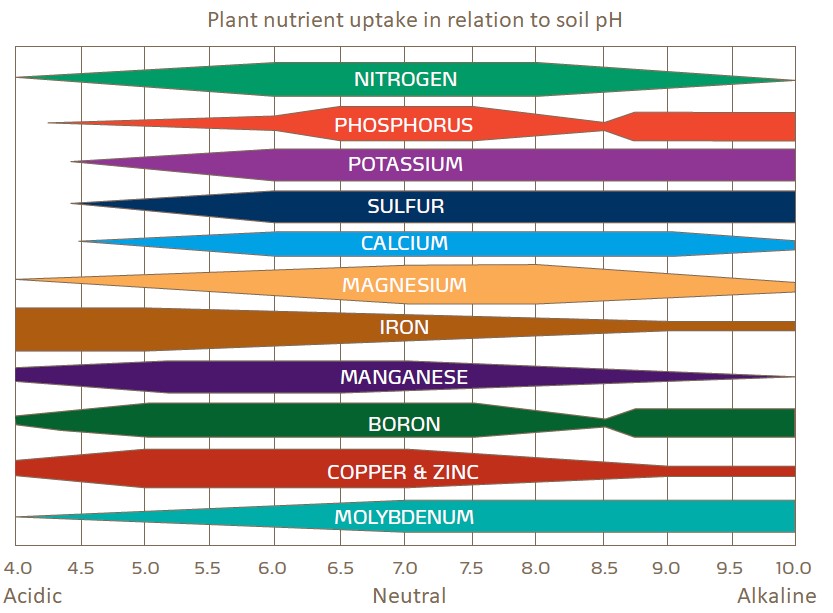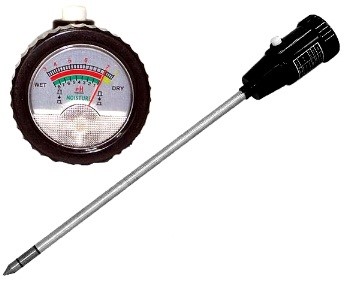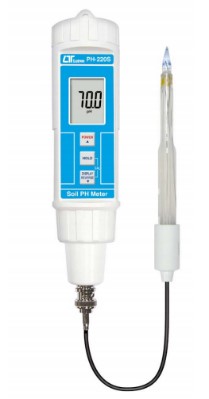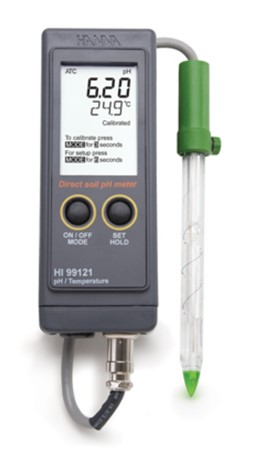What is a direct soil pH Meter?

Whether you are an avid home gardener or horticultural professional, the secret to raising healthy and luscious plants begins in the soil. Having ideal soil pH is essential and a direct soil pH meter makes it easy to obtain accurate field measurements for plant and soil management.
pH meters come in many different shapes and sizes, all with different functions and capabilities. Is there a difference? The short answer is yes. Different pH meters have been designed for specific needs. In this article, we explore direct soil pH meters, their applications and what differentiates them from soil pH meters and pH meters in general.
What is pH and why measure the pH of soil at all?
pH is the measure of acidity or alkalinity of a product. The key indicator is hydrogen ion activity, which is expressed through the potential for hydrogen or ‘pH’. The pH scale is a logarithmic scale ranging from 0-14, with 0 being extremely acidic, 7 being neutral and 14 being alkaline.
Each variety of plant has its own 'ideal' pH range. For most plants this range falls between 5.5 and 7.5 pH.
The pH of soil affects the uptake of key nutrients, so when your pH is ‘out of whack’ your plants or crops will not receive optimal nutrient uptake and therefore not reach their full potential.
Soil pH can be affected by many things including weather, fertiliser, soil type, other plants in the area, nutrient availability and the type or amount of irrigation. With all these variables soil pH can change rapidly and substantially. So if you depend on soil yields it’s essential that you take regular pH measurements.

What is a direct soil pH meter?
A direct soil pH meter is a pH device where, as the name says, soil pH can be sampled directly from the ground. Generally, these devices comprise a meter and an electrode. The electrode can be built into the meter itself or supplied separately from the meter.
Direct soil pH meters are used in the field when collecting samples and access to a lab to slurry test is not possible. The direct ground method is simple and delivers instantaneous results. However, for accuracy and to avoid instrument damage care is needed to remove rocks and sticks and to not force the electrode into the ground.
The main difference between pH meters, soil pH meters and direct soil pH meters is generally the electrode composition and meter durability. Due to the nature of direct soil pH sampling the electrode needs to be made of tough, weather-resistant and durable material that is strong enough to penetrate soil directly. The meter’s body must be robust and built to withstand dust ingress, water penetration and impact.
(Make sure you see our article How to use a soil pH Meter for a simple direct ground measurement method).
Examples of Direct Soil pH Meters
Instrument Choice scientists have assembled a representative group direct soil meters, each with different features and benefits.
Soil pH and Moisture Meter with Probe - ICZD06 
Quick, accurate and direct, the ICZD06 is an ideal meter for measuring pH in the field. What’s more, this meter will never run out of power - it’s battery-free!
Constructed with the meter and electrode in one, the ICZD06 has a 30cm long stainless-steel probe, able to withstand insertion in firm soils.
Soil pH Meter with Separate Electrode - PH220S 
The PH220S with the separate spear tip electrode is suitable for direct soil pH measurement. It’s accurate and boasts an extremely fast sampling rate.
The electrode tip is made from highly durable glass, making it suitable for insertion directly into soils. The electrode body comprises tough epoxy.
Spear Tip Waterproof pH Tester .jpg?Action=thumbnail&algorithm=fill_proportional&width=124)
This model is easy-to-use. The tough open pore spear tip electrode is encased in a strong plastic body. The pH Tester is rated IP67 water and dustproof – perfect for fieldwork.
Direct Soil pH Meter Measurement Kit HI99121
The HI99121 is a specialised device designed for the rigours of direct soil pH measurement. The built-in electrode features a conical tip for softer soil, and a plastic auger to perforate harder soil while reducing the risk of electrode damage.
Conclusion
Maintaining soil in the ideal pH range will result in better nutrient update and optimal plant growth.
There is a wide range of rugged direct soil pH meters available on the Instrument Choice website. Need help finding the best direct soil pH meter for your application? Have some questions about pH or pH meters? Contact one of our friendly scientists on 1300 737 781 or email [email protected]
Also interesting
A Tachometer is a sophisticated name for a relatively commonplace device. This article focuses attention on digital tachometers, what they are, how they work, and provides common examples of their use.

Home weather stations are effective instruments for capturing and sharing hyperlocal weather data. A data logger records acquired data for later analysis and graphing. Put a weather station together with a data logger and you have a real game-changer - a data logger weather station!
There are many types of data logger weather stations on the market today. These range from physical plug-in data loggers to wireless transmission loggers that send real-time information straight to your phone or computer.

